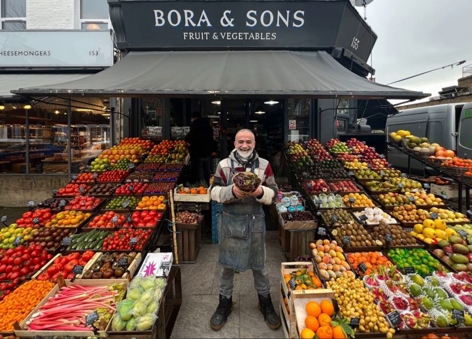

This week's English Apple Man Journal covers a number of different issues. Some from other countries and some from home
But first some sad news as yet another of the fruit farming fraternity that have been part of my 65 years involved in fruit growing has passed onto God's great orchards in heaven
Below: Ken Jenner
 Ken Jenner
Ken Jenner
Kenneth John Jenner was born on 22nd July 1936 and was the older brother of David and sister Betty. He took over farming Great Sheephurst Farm, Marden, with his brother David, following the sudden and unexpected death of his father in 1956.
At that time the farm was 40ha consisting of predominantly hops which were blighted with verticillium wilt. These were quickly 'grubbed' and replaced with apples and in 1960 the opportunity to buy the neighbouring farm extended the area to 100ha. Two further farm purchases were made in 1987 and 1997, expanding the area to its current 200ha (40ha apples and 160ha arable).
Ken officially 'retired' from farming in 2016 following a very successful 60 year partnership with his brother David. He is succeeded by his wife, Gay and two sons Nigel and William.
Kenneth John Jenner was born on 22nd July 1936 and was the older brother of David and sister Betty. He took over farming Great Sheephurst Farm, Marden, with his brother David, following the sudden and unexpected death of his father in 1956.
As I get older, nostalgia becomes more and more integral to my life. Of course, old age is a key for nostalgia, but the experiences of a lifetime and those of friends is what makes nostalgia so special!
After Ken's son Nigel rang me with the sad news last week and sent me a short Obituary of Ken, I remembered Ken had a special collection of Vintage cars. Click on GOOGLE for any information, I came across the script of an interview by Katy Sharpe of a film; filmed by: Joe Spence Dated: 6th August 2015. Covers period 1956 - 2015
Opening Extracts..........
Katy: Sorry - would you be able to just tell me about the farm please?
 Kenneth: Yeah, I'll tell you,
Kenneth: Yeah, I'll tell you,
Katy(KS): Yeah.....
KJ: The cost of things
Having read it my thoughts were: NOSTALGIA personified. Having sought and received son Nigel's approval, the link below of the transcript is printed in full!
Click on Ken Jenner interviewed by Katy Sharpe
Prospects for 2024
As we look forward to another growing season, the current mild weather suggests it may be an early start blossom year. Talking to an agronomist friend. he speculated the orchard sprayer may be out soon, earlier than ever.
However we are still short of the 'winter chill temperature profile' required for quality fruit bud. This requirement varies by variety and by fruit. Apples and Cherries for example! Apple varieties like Gala need less than Cox. Cherries need less than in past history due to the new rootstocks and varieties, but it is still an important factor.
Plants need sufficient cold to resume normal spring growth following the winter dormant period. This is commonly referred to as its "chilling requirement." Plant species as well as horticultural varieties vary widely in their winter cold requirement. Fruit trees need 'winter chill' - the warmer winters have led to a less certain level of winter chill. Simplistically, apples in the UK need circa 800-1200 chill units by the end of February to ensure quality flowers at blossom time. Over the last ten years, the winter chill has varied enormously, with 2016 just about 'scraping home'
Anyway, short of a natural disaster, 'frost at blossom time' or 'hail in the summer' we should see a bigger UK crop than in 2023.
Interestingly, crop forecasts for the Southern Hemisphere suggest much heavier crops of apples, though not so for Pears.
The USA also has a larger crop to sell in 2023/2024. The 2023 bumper apple crop spells bad news for growers' 2024 finances: The volume is driving down prices as labour costs soar.
See LINK below
Click on USA Crop forecast
Europe
With a broader range of product types, an array of trademarked brands, and a series of targeted marketing programmes, the business of selling apples has changed dramatically in recent years
Italy's two largest apple exporters, Vip and Vog, have a tricky task on their hands. But it's a challenge more or less entirely of their own making, and one they are very happy to take on. Selling apples in 2024 is remarkably different for these South Tyrolean suppliers compared with even a decade ago.
In the past few years, both have made significant investments in licensed varieties. Each of these trademarked apples has its own brand that must be managed, merchandised and marketed. As a result, the companies' respective product portfolios have become far more complicated, their marketing plans more intricate.
And for a handful of those so-called club varieties - Cosmic Crisp, Envy, Kanzi, Yello - the two are joint licensees with a shared business objective. In some cases, they even work together on a coordinated promotional plan.
Open-source varieties like Gala, Braeburn and Golden Delicious once dominated the offer. And although they remain larger in terms of volume, the club varieties now make up an increasingly large and commercially valuable proportion of the mix.
Southern Hemisphere - Info. World Apple and Pear Association.
The six leading top fruit suppliers in the Southern Hemisphere expect to produce a combined crop of just under 4.78m tonnes of apples in 2024, up 1.1 per cent on last year, according to a new forecast released by the World Apple and Pear Association.
The group, which made the prediction during its annual meeting at Fruit Logistica in Berlin, also said it anticipated a 2.3 per cent annual decrease in pear production this year to almost 1.47m tonnes across the same six nations - Argentina, Australia, Brazil, Chile, New Zealand, and South Africa.
For apples, South Africa remains the group's largest producer with 1.4m tonnes (+4.6 per cent), followed by Brazil (1.1m tonnes, equal), Chile (912,000 tonnes, -8.4 per cent), New Zealand (557,871 tonnes, +14.7 per cent), Argentina (501,000 tonnes, -4.8 per cent), and Australia (308,000 tonnes, +5.8 per cent).
Gala dominates the Southern Hemisphere crop with 1.58m tonnes, a figure which is in line with 2023 but 11.4 per cent below the three-year average.
Exports are expected to rise by 8 per cent to 1.55m tonnes, driven by increases of 5.1 per cent to 572,280 tonnes in South Africa and 5.3 per cent to 493,000 tonnes in Chile.
Exports from New Zealand should also grow, by 22.2 per cent to 381,729 tonnes. But they are forecast lower in Argentina (70,000 tonnes, -4.1 per cent) and Brazil (32,000 tonnes, -10.6 per cent).
European apple stocks stood at 3.85m tonnes of 1 January 2024, which is 4.6 per cent lower than at the start of 2023.
However, stock figures were higher in the US at around 2.14m tonnes, up 33.6 per cent compared with the previous year.
In conclusion, The English Apple Man displays two excellent pictures of fruit and vegetables very well presented. One in a Waitrose in Kent with a great selection of 'home grown' apples and the second in London of a traditional greengrocer displaying fruit and vegetables at their best
Below: left. Waitrose and right. Greengrocer display

![]() That is all for this week
That is all for this week
Take care
The English Apple Man